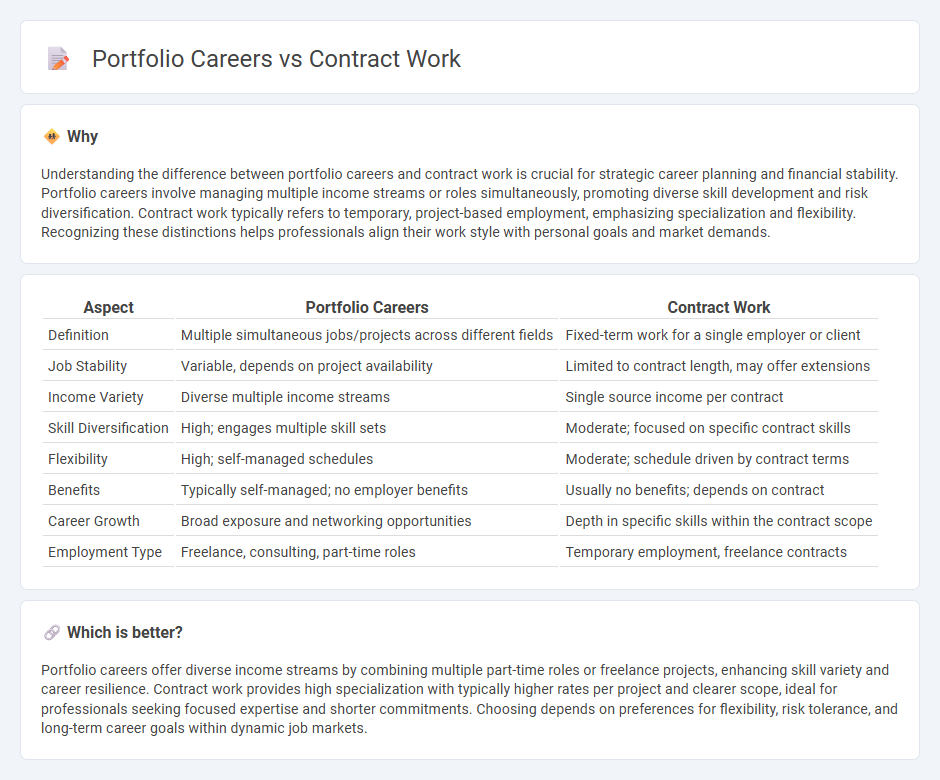
Portfolio careers involve juggling multiple part-time roles or projects across different fields, offering diverse income streams and skill development. Contract work typically focuses on fixed-term agreements with a single employer or client, providing specialized expertise and financial predictability. Explore the benefits and challenges of both to determine the best fit for your career goals.
Why it is important
Understanding the difference between portfolio careers and contract work is crucial for strategic career planning and financial stability. Portfolio careers involve managing multiple income streams or roles simultaneously, promoting diverse skill development and risk diversification. Contract work typically refers to temporary, project-based employment, emphasizing specialization and flexibility. Recognizing these distinctions helps professionals align their work style with personal goals and market demands.
Comparison Table
| Aspect | Portfolio Careers | Contract Work |
|---|---|---|
| Definition | Multiple simultaneous jobs/projects across different fields | Fixed-term work for a single employer or client |
| Job Stability | Variable, depends on project availability | Limited to contract length, may offer extensions |
| Income Variety | Diverse multiple income streams | Single source income per contract |
| Skill Diversification | High; engages multiple skill sets | Moderate; focused on specific contract skills |
| Flexibility | High; self-managed schedules | Moderate; schedule driven by contract terms |
| Benefits | Typically self-managed; no employer benefits | Usually no benefits; depends on contract |
| Career Growth | Broad exposure and networking opportunities | Depth in specific skills within the contract scope |
| Employment Type | Freelance, consulting, part-time roles | Temporary employment, freelance contracts |
Which is better?
Portfolio careers offer diverse income streams by combining multiple part-time roles or freelance projects, enhancing skill variety and career resilience. Contract work provides high specialization with typically higher rates per project and clearer scope, ideal for professionals seeking focused expertise and shorter commitments. Choosing depends on preferences for flexibility, risk tolerance, and long-term career goals within dynamic job markets.
Connection
Portfolio careers and contract work are interconnected as both emphasize flexible, diverse employment arrangements that allow professionals to engage in multiple roles simultaneously. Contract work offers the project-based assignments typical in portfolio careers, enabling individuals to build varied skill sets and income streams. This synergy supports career adaptability and resilience in dynamic job markets.
Key Terms
Flexibility
Contract work offers high flexibility by allowing professionals to select specific projects and set their own schedules, adapting easily to changing priorities. Portfolio careers provide an even broader flexibility by combining multiple income streams across different roles, fostering diverse skill development and reducing dependency on a single employer. Explore more insights about how flexibility reshapes modern career choices and work-life balance.
Job Security
Contract work offers less job security due to fixed-term agreements and reliance on continual client acquisition, whereas portfolio careers provide diversified income streams by combining multiple part-time or freelance roles. Job security in portfolio careers depends on maintaining various sources of income, reducing the impact of losing a single contract. Explore strategies to enhance job stability in both career models for better financial resilience.
Skill Diversification
Contract work offers professionals short-term, project-based opportunities to apply specialized skills across various industries, promoting rapid skill acquisition and adaptability. Portfolio careers involve managing multiple concurrent roles or projects, enabling continuous skill diversification by blending contract roles, freelance work, and entrepreneurial ventures. Explore strategies to effectively diversify your skills and optimize career flexibility through contract and portfolio approaches.
Source and External Links
What Is a Contract Job, and How Does It Work in 2025? - Upwork - A contract job is when a business hires a worker to complete a specific task for a set time and fixed payment, commonly used for short-term projects, specialized skills, or scaling needs, providing flexibility for both employers and contractors.
Contract Jobs, Employment in Raleigh, NC | Indeed - Contract jobs vary widely by industry and role, often requiring negotiation and management of contracts as part of job responsibilities, with many listings available for various specialties in Raleigh, NC.
Independent contractor (self-employed) or employee? - IRS - Correct classification of workers is essential: independent contractors manage their own taxes and benefits whereas employees have payroll taxes withheld by employers, influencing legal and tax obligations for businesses and workers alike.
 dowidth.com
dowidth.com